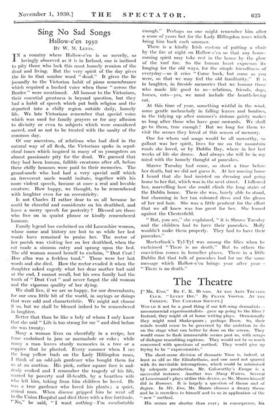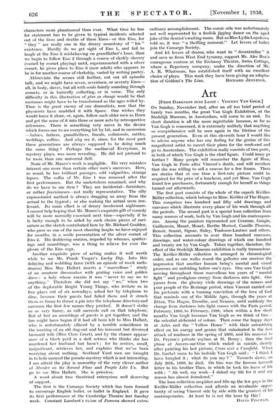The Theatre
[" MR. ENO." BY C. K. MtNun. . 1"lif E AltTS THEATRE CLUB. "LUCKY DIP." By VOSPER. AT THE COMEDY. TUE CAMARGO SOCIETY.] WOULD it not be a good thing if our left-wing dramatists-- uncommercial experimentalists—gave up going to the films '1 Instead, they might sit at home writing plays. Occasionally they might read Shakespeare ; perhaps Ibsen. So, their minds would cease to be governed by the ambition to do on the stage what can better be done on the screen. They would cease to flash innumerable scenes past us, with scraps of dialogue resembling captions. They would not be so much concerned with questions of method. They would give up trying to be " expressionists."
The short-scene division of dramatic Time is, indeed, at least as old as the Elizabethans, and one need nut quarrel with its inevitable interruptions, which could be minimised by adequate production. Mr. Galsworthy's Escape is a successful instance. Another was Many Waters. Several of Lenormand's plays utilize this device, as Mr. Munro himself did in Rumour. It is largely a question of theme and of degree. In Mr. Eno, Mr. Munro chooses a dreary theme and he is merciless to himself and to us in application of the " new " method.
His scenes are shorter than ever ; in consequence, his
characters more phantasmal than ever. What time he has for statement has to be given to typical incidents selected out of the lives and deaths of these Enos—or this Eno, for " they " are really one in the dreary monotony of " his " existence. Hardly do we get sight of Eno 1, and fail to laugh at the Eno 3 misbehaving on grandfather's knee, than we begin to follow Eno 2 through a course of clerkly slavery (varied by cornet playing) until, superannuated with a silver cornet, he gives place to Eno 8 (now adult) who appears to
be in for another course of clerkship, varied by writing poetry. Abbreviate the scenes still further, cut out all episodic talk, and we might have seven, seventeen, or seventy Enos— all, in body, slaves, but all with souls faintly sounding through cornets, or in butterfly collecting, or in verse. The only difficulty in this illustration of plus ca change would be that costumes might have to be transformed as the ages rolled by. Time is the great enemy of our dramatists, now that the physicists have muddled it with Space. One wishes they would leave it alone, or, again, follow such older men as Ibsen and get the sense of it into three or more acts by retrospective references. There is something very naive in the device which forces one to see everything bit by bit, and in succession —babies, fathers, grandfathers, lineals, collatorals, rattles, weddings, coffins. And why see it, since, for the most part these generations are always supposed to be doing much the same thing ? Perhaps the mediaeval Everyman, in mystery plays, was more revealing. He did not pretend to be more than one universal Self.
None of Mr. Munro's work is negligible. His very mistakes interest one more than certain other men's successes. Here, as usual, he has brilliant passages, odd vulgarities, strange lapses. The coffin of Mr. Eno 1 was removed after the first performance. But the undertakers remained, and why do we have to see them ? They are incidental—furnishers, or rather fournisseurs—not really representative. The silly expressionist method is always dragging us away from the actual to the typical ; or else making the actual seem irre- levant. Its main effect is of dreary incoherent nightmare. I cannot help hoping that Mr. Munro's exquisite gift of comedy will be more normally exercised next time—especially if he is lucky enough to be aided by such choice pieces of cari- cature as the sketch contributed here by Mr. Richard Goolden, who gave us one of the most cheering laughs we have enjoyed for months, in a senile presentation of the silver cornet of Eno 2. His doddering oration, impeded by wheezes, sputter- ings and mumblings, was a thing to relieve for ever the gloom of the Eno saga.
Another exquisite piece of acting makes it well worth while to see Mr. Frank Vosper's Lucky Dip. Into this delaying and wobbling farce (with an episode of mock melo- drama) Miss May Hallett inserts a " marvellous " study of an amateur dressmaker with grating voice and golden dress : a lady whose maxim it was " never to say no to anything.- Therefore she did not say " no," when two of the deplorable Bright Young Things, who irritate us in five plays out of six nowadays, asked her by telephone to dine, because their guests had failed them and it struck them as funny to thrust a pin into the telephone directoryand summon the first few names they pricked. It doesn't strike us as very funny, as call succeeds call on that telephone. But at last an asemblage of guests is got together, and the fun might have begun if it had all been left to Miss Hallatt, who is unfortunately effaced by a terrible coincidence in the meeting of an old dug-out and his innocent but divorced barmaid wife (Miss Clare Greet), and by the chance appear- ance of a black peril in a daft actress who thinks she has murdered her husband but hasn't ; for he arrives, small, insignificant, retrieves her, and explains that we've been worrying about nothing. Scotland Yard men are brought in to help unravel the pseudo-mystery which is not interesting. I am afraid the play is unworthy of the very clever author of Murder on the Second Floor and People Like Us. But go to see Miss Hallatt. She is priceless.
A word about two theatrical enterprises well deserving of support.
The first is the Camargo Society which has been formed to encourage English ballet, or ballet in England. It gave its first performance at the Cambridge Theatre last Sunday week. Constant Lambert's vision of Pomona showed extra- ordinary accomplishment. The comic side was unfortunately not well represented by a foolish jigging dance- on the aged joke of the dentist's waiting-room. But as Miss Lydia Lopokova told us, it was " a thrilling moment." Let lovers of ballet join the Camargo Society.
And let lovers of drama, who want to " decentralize " it and save us from West End tyranny, support Mr. Alec Rea's courageous venture at the Embassy Theatre, Swiss Cottage, where a Repertory company, under the direction of Mr. A. R. Whatmore, has established itself with an excellent choice of plays. This week they have been giving an adapta-











































 Previous page
Previous page